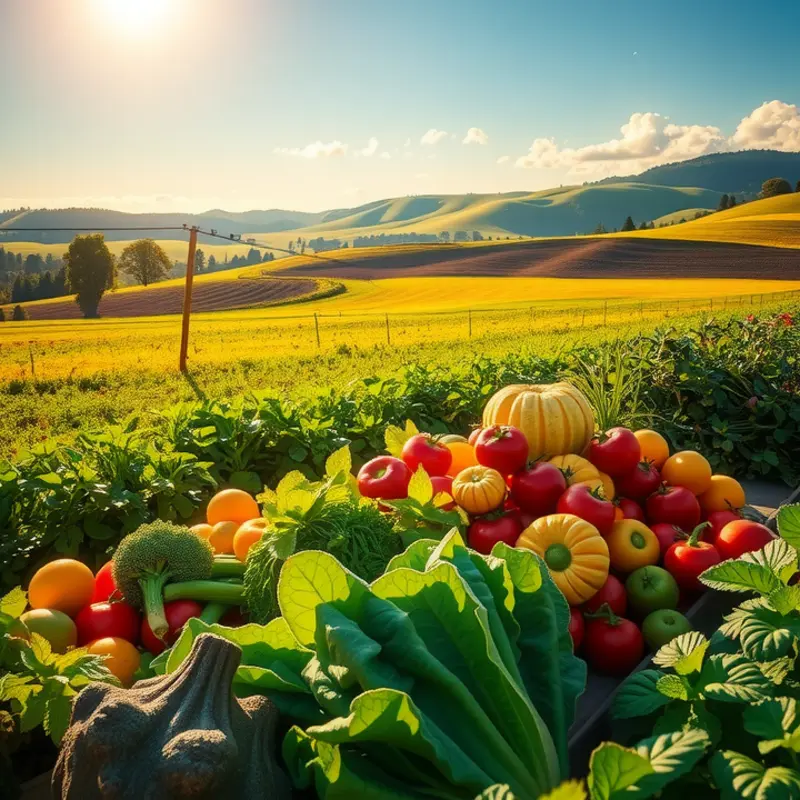Choosing ethically farmed foods is essential for environmentally-conscious individuals aiming to make sustainable food choices. With the growing awareness of environmental impacts, many are seeking alternatives that promote health, biodiversity, and ethical practices. By selecting foods from conscientious farms, we can directly support practices that protect the earth, reduce carbon footprints, and enhance our ecosystems. This guide will explore practical steps to identify, select, and advocate for ethically sourced foods that nourish both our bodies and the planet.
Understanding Ethical Farming Practices

Ethical farming practices integrate environmental stewardship, animal welfare, and sustainable land management to cultivate a more balanced ecosystem. At its core, ethical farming emphasizes soil health—a cornerstone for any thriving agro-system. Healthy soil, rich in organic matter and teeming with life, functions as a carbon sink, reduces erosion, and supports nutrient-dense crops. Techniques like crop rotation, cover cropping, and reduced tillage promote this crucial soil vitality by maintaining nutrient levels and protecting soil structure.
Animal welfare is another pillar of ethical farming. The humane treatment of farm animals enhances their well-being and yields higher quality produce. Farmers committed to ethical practices ensure animals have access to pastures, engage in natural behaviors, and live in stress-free environments. Free-range and pasture-raised models exemplify these principles, resulting in happier, healthier animals and, consequently, healthier food products.
Sustainable farming practices move beyond maintaining soil and animal health to encompass broader ecological benefits. Regenerative agriculture, a prime example, goes further than sustainable farming by actively rehabilitating ecosystems. It employs methods such as agroforestry, holistic grazing, and permaculture to restore biodiversity, improve water cycles, and strengthen ecosystems’ resilience to climate change effects.
The benefits of regenerative practices over conventional methods are substantial. Conventional agriculture often relies on chemical fertilizers and pesticides, which can degrade soil quality, reduce biodiversity, and elevate greenhouse gas emissions. In contrast, regenerative methods help capture carbon in the soil and boost biodiversity, establishing robust ecosystems less susceptible to pests and diseases.
Ethical farming plays a pivotal role in climate change mitigation. By sequestering atmospheric carbon and nurturing resilient landscapes, these practices help counteract harmful carbon emissions and slow global warming. This approach not only benefits the environment but also offers consumers healthier food options—crops produced on regenerative farms often have higher nutritional content, including increased levels of essential vitamins and minerals.
Recognizing ethical farming involves being informed about various labels and certifications. Certifications such as organic, biodynamic, or fair trade can guide consumers toward ethically produced foods. These labels often indicate adherence to standards that limit synthetic inputs and emphasize humane animal treatment and fair labor conditions. By choosing products with these certifications, consumers support farming systems that foster environmental and social well-being.
For a deeper understanding of how to minimize waste alongside choosing ethical foods, explore eco-smart kitchen storage solutions. This resource links ethical food choices to broader sustainability efforts at home, reinforcing the interconnectedness of sustainable practices in everyday life.
Practical Steps to Choose Ethically Farmed Foods

Choosing ethically farmed foods is an empowering step toward a healthier planet. Start by being a conscious shopper. When at the store, focus on labels that emphasize sustainability. USDA Organic is a comprehensive certification highlighting practices that foster cycling of resources, promote ecological balance, and conserve biodiversity. However, don’t limit yourself to organic labels. Certifications like Fair Trade and Rainforest Alliance also ensure that production practices meet specific environmental and social standards.
Building connections with local producers is another significant aspect. Many communities have local farmers’ markets that provide direct access to ethically farmed goods. Here, you can ask questions about farming practices and even visit farms to observe their operations firsthand. Direct interaction not only supports local farmers but also builds trust and community resilience. Consider supporting Community Supported Agriculture (CSA) programs. CSAs allow consumers to subscribe to regular boxes of locally harvested products, offering a sustainable and community-centric way to obtain ethically farmed produce throughout the growing season.
Educate yourself about the standards of certifications you frequently encounter. Not all labels are created equal, and understanding them can guide more informed decisions. Many consumers might be interested in learning more about different types of food certifications beyond just organic. Explore the role of proper food storage in enhancing the sustainability of your purchases.
Public education is another tool for encouraging widespread adoption of ethical food choices. Share insights and experiences within your network. A dinner party featuring local, ethically farmed ingredients is an excellent opportunity to discuss sustainable practices with friends and family.
Empower others by introducing them to simple steps they can take in their daily lives. Encourage small changes like reducing meat consumption or opting for fish known for sustainable harvesting methods. Collectively, these actions initiate a ripple effect.
Participate in community events focused on sustainable agriculture. Workshops, farm tours, and eco-fairs raise awareness about pressing agricultural issues. They are also perfect venues to learn from experts and meet others interested in sustainability. Networking within these spaces often opens doors to further opportunities, such as volunteering at local farms or starting educational initiatives.
Combining these practices supports a larger movement toward an ethically conscious food system. By actively participating in this shift, you contribute to a healthier planet, encouraging a better-informed community who values responsible consumption.
Final words
Choosing ethically farmed foods is not just a personal choice; it’s a powerful statement of support for a sustainable future. By understanding ethical practices and actively seeking out these products, you contribute to environmental conservation, animal welfare, and the health of local communities. This collective effort encourages a shift toward a more sustainable food system. Remember, each small step you take in choosing ethically sourced food can lead to a significant impact on our planet. Stay informed, engage with local farms, and inspire those around you to join in the journey towards healthier eating habits and a greener world.








